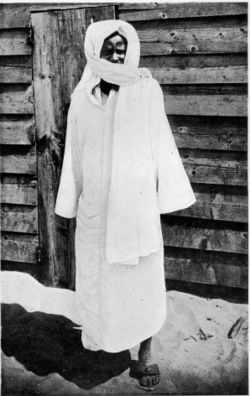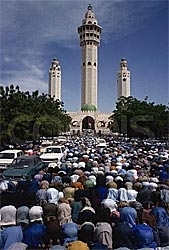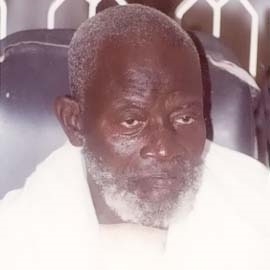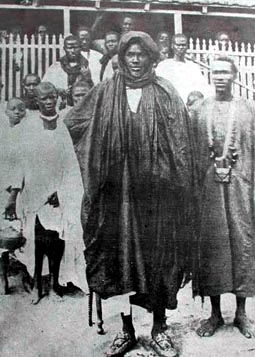 |
| Cheikh Ahmadou Bamba, the founder of Muridism. (courtesy wikipedia) |
In 1895 the French Privy Council session decided on a verdict to send Cheikh Ahgmadou Bamba into exile "until the popular upheaval caused by his teachings is completely forgotten in Senegal."
Cheikh Ahmadou Bamba, the object of this terrible decision solemnly declared at the same period: "The enemies decided to send me on exile. But if they knew that this decision would be the source of great benefit and graces for me they would not do it."
Cheikh Ahmadou Bamba was born ca 1854 in a small village called Mbacke Cajoor in the internal regions of Senegal. From his early childhood he displayed amazing qualities of wisdom, sainthood and knowledge that earned him respect and consideration from his community.
Son of a scholar and a most virtuous woman, called Mame Diarra Bousso, very popular in Senegal, Cheikh Ahmadou Bamba showed, at an early age, a limitless love of his creator and started composing Arabic poems to the glory of the prophet Muhammad. These poems are extraordinary in terms of beauty and innovation in the way he rhymed them.
Extremely gifted in poetry writing, Cheikh Ahmadou Bamba composed wonderful poems in such rare style that they are the pride of the Murids (his disciples) today. Then he undertook versifying most religious science books written by early scholars and which dealt with religious legislation and rules to make them more accessible and understandable to ordinary people.
His uncommon knowledge of these sciences and a boundless patience, wisdom and generosity towards his contemporaries earned him the love of people from all corners of Senegal, and they started joining him to become his disciples.
He first stayed in a village called Mbacke Baol for some years before getting a revelation from his LORD that bid him to leave the village and seek for a place called TOUBA. Talking about this very place, he once wrote in one of his poems:
"The LORD has blessed me with a place that rid me with all obstacles the minute I entered it."
Touba, the place he was referring to in this verse and that he founded in 1887, rapidly grew into a big religious city and a knowledge centre, as people and scholars started coming from everywhere to join the Sheik and benefit from his religious teachings.
 |
| Touba during the Magal (Courtesy htcom.sn) |
Because of his growing number of disciples, the French colonisers started suspecting the Sheik of sedition and insubordination. They started seeing in the ever growing number of disciples of Cheikh Ahmadou Bamba a force that threatened to be an obstacle in their way to the total pacification of the country. At that time the French troops were confronted with the fierce resistance of a young king called Lat Dior Ngone Latyr Diop, who was giving the French army troops a hard time on the battlefield.
Before the appearance of Cheikh Ahmadou Bamba on the Senegalese religious and political scene there had been freedom fighters like Lat Dior Diop, Alboury Ndiaye, El Hadji Oumar Tall, all who opposed the invasion of their country by the French colonisers. They raised armies, brandished their weapons and took a stand. But all of them were defeated by the military and technical superiority of their adversary.
Describing this painful period of the meeting of two opposed worlds, the European world of technicity and modernity and the dark African world of emotion, Cheikh Amidou Kane, in his book entitled, The Ambiguous Adventure, wrote: "Some brave villagers like the Diallobes pointed their spears and brandished their machetes, the French soldiers let them come near, then they fired the cannons. The defeated Africans never understood what happened."
 |
| Serigne Saliou Mabcké (www.htcom.sn) |
After these epic battles that resulted in quick victories for the French troops who enjoyed military superiority, the colonisers rapidly occupied the Senegalese land and started their assimilation policy. The objective was to turn the Senegalese people into black men with a white man mentality.
It was exactly at this turning point of Senegalese history that Cheikh Ahmadou Bamba began to gain in popularity as the Muslim masses started joining him in Touba or wherever else he was. He started teaching them the values of orthodox Islam; that is an Islam of peace based on the respect and love of every human being as a creature of God, and recognising no other master but ALLAH. He started teaching them how to acquire a correct Muslim personality based on the teaching of the prophet Muhammad, his Master and guide.
By then his disciples had started seeing in the personality of the Sheik the guide that they needed. A guide who was going to teach them to distinguish between right and wrong, justice and injustice, truth and falsehood. They considered him as the only reference they could identify with. About this the Sheik wrote:
"The LORD ordered me to declare that I am a refuge and a shield. Whoever wants salvation in this world and the hereafter must seek refuge in me."
What the colonisers would come to realise more than 14 years later was that the only enemies Cheikh Ahmadou Bamba ever taught his disciples to fight were the enemies within every individual, that is greed, hatred, passion, violence and deceit, that stand in the believer’s way to salvation. The Sheik taught them how to get rid of these vices that prevented them from gaining the agreement of their LORD and his satisfaction. He also taught them the love of work as it permitted them to maintain their dignity. In this respect, work is a central dimension in Muridism (the brotherhood founded by Cheikh Ahmadou Bamba based on prayer and work). The Sheik used to tell his disciples:
"Work as if you will never depart from this world and pray as if you were to die tomorrow."
 |
| Cheikh Ibra Fall, disciple of Cheikh Ahmadou Bamba (www.htcom.sn) |
This was the situation that led to more suspicions from the French administration towards Cheikh Ahmadou Bamba. From 1888 on, regular reports about the Sheik’s seditious attitude and alleged rebellious actions started finding their way to the desk of the Governor General of the colony. The French administration was seriously concerned about the growing popularity of Cheikh Ahmadou Bamba. They started seeing in his personality another freedom fighter who was just trying to gain time to raise an army big enough to attack them.
The fact that the Sheik sent them a letter declaring that he was not concerned about anything that belonged to this perishable world did nothing to ease the mind of the colonisers. As a result, the Sheikh was arrested in August 1895 in a place called Diewol. By that time, his only offense towards the colonisers was his being a popular religious guide who only recognised God as a master.
The day he got arrested all his disciples offered to take weapons and fight the white people. But the Sheik ordered them not to. He declared that he alone could do the fighting without shedding anybody’s blood. He asked them to go back to their homes, declaring that he would be back soon. At that time little did the disciples know that seven years would go by before they saw their spiritual guide again. Many of them believed that they would never see him alive again.
But the Sheik knew he would be back in Senegal. He told this to his disciples and even trusted one of his poems with a virtuous woman of his family, asking her to keep it for him till he came back. Some two or three years later, when the disciples started to believe that the Sheik was dead, that same woman showed them the poem and said:
"The Sheik will be back. Don’t you ever doubt that. He gave me this poem and asked me to keep it till he is back. He always keeps his words."
After arresting him, the French authorities sent Cheikh Ahmadou Bamba to St. Louis, the colonial capital city of Senegal at that time. A month later they took him aboard a ship bound for Gabon, which was at that time a dense tropical forest where all the people who resisted the colonisers' supremacy were deported to and kept in total isolation. This was the case of Samory Touré the Guinean and many other freedom fighters who found death in this forest.
Cheikh Ahmadou Bamba spent 7 years in exile. Seven long years during which he was totally isolated and separated from family, friends, disciples and Touba, his beloved city. He spent all the years of his exile praying to his lord harder than ever, recognising no other authority than that of ALLAH. He also spent his time writing poems dedicated to the prophet Muhammad, his guide and master. During these years of trials and hardships he wrote:
"The only weapons I will use to fight my enemies are the calam (pen) and the ink that I use to write my Khassaids (poems) in the glory of the Elected (the prophet Muhammad)."
He fought the arrogance of the white settlers with patience; he opposed their cannons and powder with his calam and ink, and their brutal force with a boundless love of his lord and an unwavering faith.
Cheikh Ahmadou Bamba never considered the armed fight as a good option for many reasons. First, it was prohibited by the prophet Muhammad in his last homily on Mount Arafat when he declared, talking to the Muslims: "From now on don’t shed blood anymore, for the blood and belongings of people are sacred, and bloodshed calls for bloodshed." The second reason he did not want his people to get involved in bloodshed was because he believed that the only fight worth fighting for was the one against the carnal soul and the vices in each one of us. The fight must be against the enemy within, not against any external enemy. This was what he used to teach his disciples, letting them know that the more you show patience before hardships and trials, the closer to ALLAH you get.
This non-violent and peaceful attitude finally defeated the French authorities who took him back to Senegal on November 11, 1902, after seven years in exile. During his exile, he was deported to an island where there was no other human being. He survived two years of isolation on this island, addressing the buoyant sea of Mayumba, the name of this Island in Gabon, in these terms:
"O thou Sea, if you have to be agitated, be so for fear of thy LORD and creator, and be witness that I am a sincere believer."
An account of his years of exile can still be read in his poems where the Sheik declares:
"There are some facts during my exile that I will never reveal because of my reverential fear of my LORD." It is commonly believed that he refers to some ill treatments he was submitted to during his years of exile on the Island of Mayumba in Gabon.
From 1903 to 1912, Cheikh Ahmadou Bamba was successively sent under house arrest to Mauritania, to Louga (Senegal), and on to Diourbel (Senegal) before the French administration admitted that the Sheik had no intention to fight them. The fact is, at that time, the disciples of the Sheik were ready to go and find him wherever he was, journeying for months to cover the distance between Mauritania and Senegal to pay pious visits to their guide and master, taking with them many presents called ziarra. This is why the colonisers never really believed that the Sheik’s only concern in this world was praying to ALLAH and serving his master, the prophet Muhammad.
By 1919, Antoine J. Henry Lasselves, the Administrator of the District of Diourbel, was assigned to watch the Sheik’s activities. His role was to observe the Sheik at any time of the day and send regular reports to his superiors. Here is what he wrote at the end of his mission:
"This Sheik Bamba is gifted with some innate power whose origin the human mind cannot understand so as to explain his befriending capacity. The way people give up themselves to him is extraordinary and their love of the Sheik is unconditional. He seems to have some divine light and secret similar to what we read in the stories of the great prophets and their people. But this one (the Sheikh Bamba) differs from them by his purity of heart, his generosity and his wishing good to friends and enemies alike. These are qualities his predecessors would have envied him, whatever the virtuousness, their piety or prestige were. The most unjust and ignorant people of human realities are those who accused him on false grounds, alleging that he was interested in temporal power. I am sure that the prophets and saints who waged holy war did it without having half the forces that he has got."
This report was of tremendous political and religious importance as it proved the sincerity of the Sheik and his lack of temporal power ambition. It proved that whatever motivated his exile and the persecutions he was submitted to was done out of ignorance and on false pretense.
In 1919 the French administration honoured Cheikh Ahmadou Bamba with their greatest distinction, elevating him to 'Knight of the Legion of Honor.’ He accepted the principle and symbolism of the medal, but refused to wear it on his chest out of reverential fear of being associated with worldly matters.
Today all the predictions of Cheikh Ahmadou Bamba have come true. Touba, the village he founded in 1887, has become the second biggest city in Senegal. It is the place where the Murid community celebrates the Magal and everybody respects its state of being a holy city.
One cannot talk about Cheikh Ahmadou Bamba without talking about the Magal celebrated in Touba, the capital city of Muridism. It is an annual commemoration of the Sheik's departure into exile, and it is attended by more than 2 million people who come to Touba from all over the world. It consists of three days of festivity and offering of sacrifices and guest receptions. The Magal is an event that gets bigger and bigger every year, as the Sheik predicted years ago.
Cheikh Ahmadou Bamba’s prediction of the LORD having given him a great building came true in the shape of the biggest mosque in West Africa. The visitor in Touba is impressed by the size of the mosque towering above the city. In Senegal there’s a saying that goes like, "Touba is the only city where the stranger never asks where the mosque is."
Cheikh Ahmadou Bamba departed from this world on July 19, 1927, after a life fully lived serving ALLAH and his Prophet Muhammad, producing more than 7 tons of khassaids (religious poems dedicated either to ALLAH or to the prophet Muhammad).
Today more than half the population of Senegal is Murids, disciples of Cheikh Ahmadou Bamba, the founder of Muridism. His virtuous son and present Kalif, Serigne Saliou Mbacké, is unanimously recognised as a saint, who is visited by people from all over the world.
Cheikh Ahmadou Bamba's days are celebrated in the major cities of the world, including Los Angeles, New York, Atlanta, and Rome where the Murid communities organise annual events during which they chant the poems of the Sheik and read the Holy Coran. This proves, if need be, that the message of peace Cheikh Ahamadou Bamba delivered to the whole world was a universal message.
Today the place where he was exiled in Gabon is called "Holy Mountain," and people regularly go there on pious visits with ziarras to seek for some of the Baraka of Cheikh Ahmadou Bamba.
In fact, the first thing he wrote and declared when he came back to Senegal was:
"I have forgiven my enemies whatever they did to me for the sake of the ONE (ALLAH) who cleansed me from their accusation."
Cheikh Ahmadou Bamba, the entire world thanks you.
Page created on 7/30/2015 10:59:51 AM
Last edited 1/9/2017 4:30:00 PM
